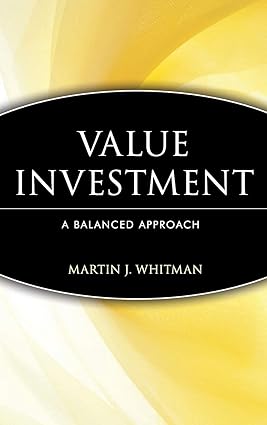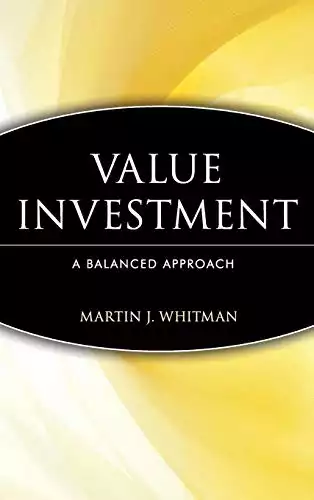Overview : Value Investing
- Book Title: Value Investing
- Author: Martin J. Whitman
- Publication Date: Originally published in February 2009
- price: $38.02
- Pages: 252
Overview of the Book
Martin J. Whitman is a seasoned financial analyst and author specializing in "Quality of Earnings" reviews. With over 2009 of experience, they provide actionable insights to help investors and businesses make informed decisions based on reliable financial data.
Introduction
In the ever-evolving world of finance and investing, few books have stood the test of time quite like "The Intelligent Investor" by Benjamin Graham. First published in 1949, this seminal work continues to shape the investment strategies of both novice and seasoned investors alike. As we navigate the complexities of modern markets, Graham's principles of value investing offer a beacon of wisdom and stability.
Book Summary
"The Intelligent Investor" presents a comprehensive framework for value investing, a strategy that focuses on identifying and purchasing undervalued securities. Graham's approach emphasizes thorough fundamental analysis, risk management, and a long-term perspective. The book is divided into several key sections, each addressing crucial aspects of intelligent investing:
- The concept of Mr. Market and market psychology
- The importance of a margin of safety in investments
- Distinguishing between defensive and enterprising investors
- Portfolio policy for both aggressive and conservative investors
- The analysis of stock options and other securities
Analysis of Themes
Value Investing in the Modern Era
Graham's value investing principles remain remarkably relevant in today's financial landscape. In an age of high-frequency trading and market volatility, the focus on intrinsic value provides a stabilizing force. Investors who adhere to Graham's teachings are better equipped to weather market storms and capitalize on long-term growth opportunities.
The Mr. Market Analogy
One of the book's most enduring concepts is the personification of the market as "Mr. Market," an emotional and often irrational entity. This analogy serves as a powerful reminder to investors to maintain objectivity and discipline in their decision-making process, especially in times of market exuberance or panic.
Margin of Safety
Graham's emphasis on the margin of safety is particularly pertinent in today's high-valuation environment. By insisting on a significant discount between a security's price and its intrinsic value, investors can mitigate risk and enhance their potential for long-term success.
Writing Style
Graham's prose is clear and accessible, making complex financial concepts understandable to a broad audience. While some passages may feel dated, the overall narrative remains engaging and informative. The author's use of analogies and real-world examples helps to illustrate key points effectively.
Strengths and Weaknesses
Strengths:
- Timeless principles applicable to various market conditions
- Comprehensive coverage of value investing strategies
- Emphasis on risk management and long-term thinking
Weaknesses:
- Some examples and data may feel outdated
- Limited discussion of modern financial instruments and technologies
- Conservative approach may not appeal to growth-oriented investors
Comparison to Other Works
While "The Intelligent Investor" stands as a cornerstone of value investing literature, it's worth comparing it to other influential works in the field:
- Security Analysis" (also by Graham): A more technical companion to "The Intelligent Investor
- Common Stocks and Uncommon Profits" by Philip Fisher: Focuses more on qualitative analysis and growth investing
- One Up On Wall Street" by Peter Lynch: Offers a more accessible approach to stock picking for individual investors
Relevance to Current Market Trends
In an era of cryptocurrencies, fintech innovations, and evolving market dynamics, Graham's principles provide a valuable framework for evaluating new investment opportunities. While the book doesn't directly address these modern developments, its emphasis on fundamental analysis and risk management remains crucial for navigating today's complex financial landscape.
"The intelligent investor is a realist who sells to optimists and buys from pessimists." - Benjamin Graham
This quote encapsulates Graham's contrarian approach, which is particularly relevant in today's often sentiment-driven markets.
Highlights from Value Investing
- Core principle: Focus on buying undervalued stocks with solid fundamentals for long-term growth.
- Intrinsic value: Emphasizes determining a company's true worth through detailed financial analysis.
- Margin of safety: Invest with a cushion to protect against unforeseen market downturns.
- Patience: Encourages a long-term approach and avoiding emotional reactions to market fluctuations.
- Market inefficiency: Highlights how markets can misprice stocks, creating opportunities for value investors.
- Investment discipline: Stresses the importance of sticking to a well-defined investment strategy.
Conclusion
"The Intelligent Investor" continues to be a foundational text in the world of finance and investing. Its principles of value investing, risk management, and rational decision-making are as relevant today as they were when first published. While the financial landscape has evolved significantly since Graham's time, the core tenets of his approach provide a robust framework for navigating modern markets. For both novice investors looking to build a solid foundation and experienced professionals seeking to refine their strategies, "The Intelligent Investor" offers invaluable insights. Its emphasis on long-term thinking and disciplined analysis serves as a counterbalance to the often short-term, speculative nature of today's markets.





